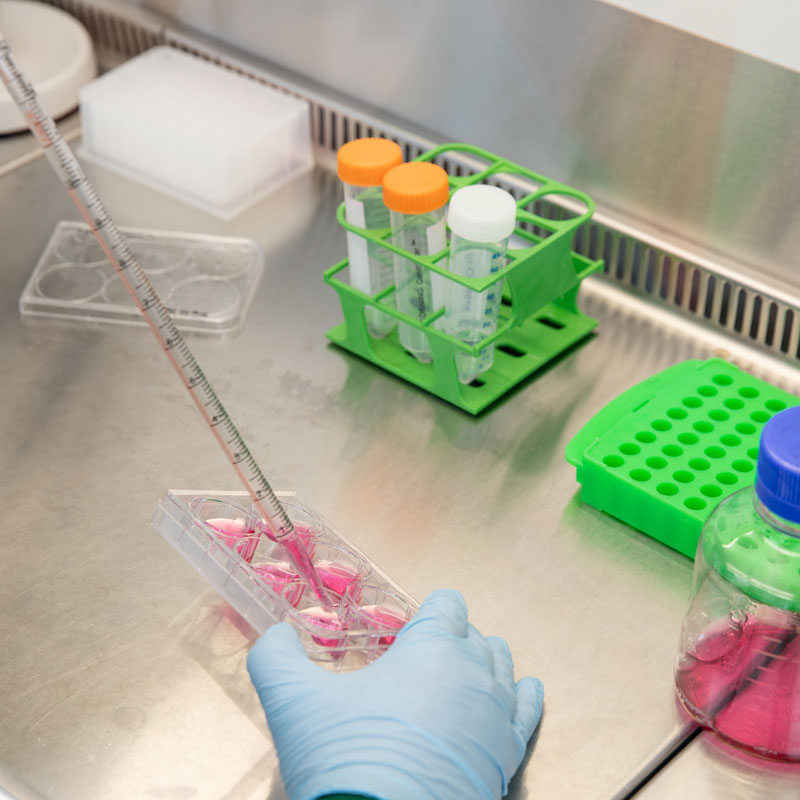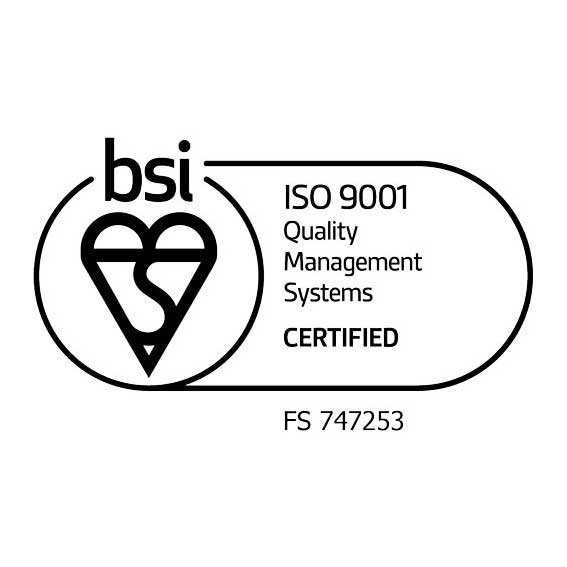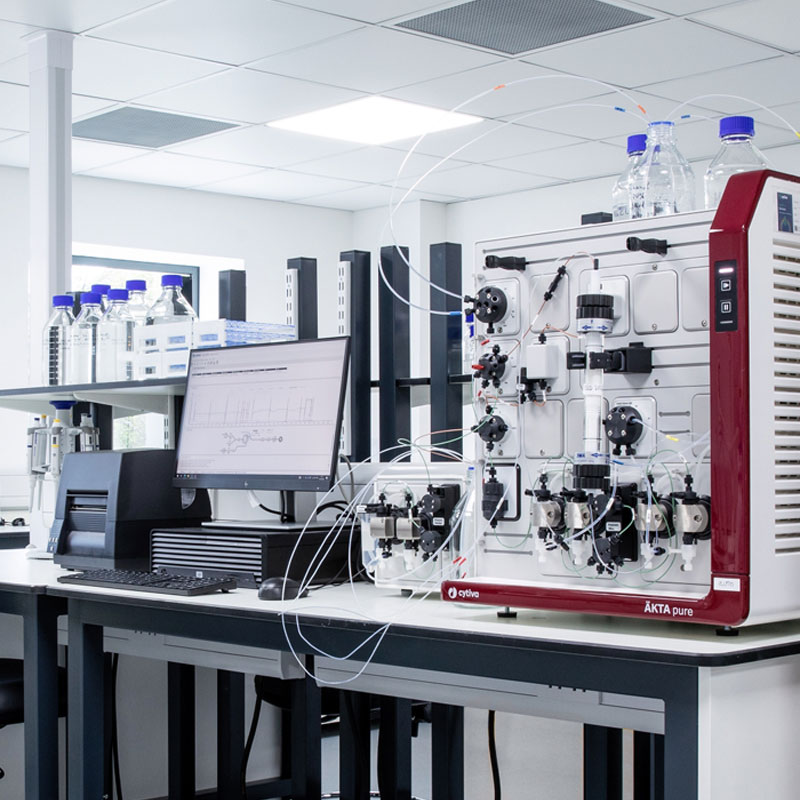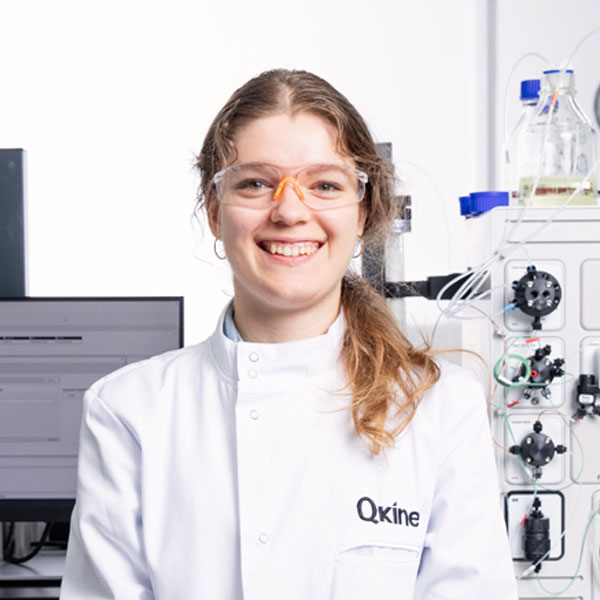Growth factor and cytokine by cell type
Dendritic
Cells

Dendritic cells
Dendritic cells (DCs) are a type of antigen-presenting cell (APC) that play a critical role in initiating and regulating immune responses. They are found in tissues that are in contact with the external environment, such as the skin, mucosal surfaces, and lymphoid organs. Dendritic cells play a central role in linking the innate and adaptive immune systems by capturing antigens, activating T cells, and regulating immune responses. Their ability to initiate and modulate immune responses makes them essential for effective immunity against pathogens and for maintaining tolerance to self-antigens. Qkine proteins for dendritic cells include IL-4 and GM-CSF.
Endothelial cells

Endothelial
Endothelial cells line the interior surface of blood vessels, forming a thin layer known as the endothelium. They play a crucial role in maintaining vascular function and homeostasis. Endothelial cells serve several important functions, including regulating the passage of substances and cells between the bloodstream and surrounding tissues, controlling blood vessel tone and permeability, and participating in the formation of new blood vessels (angiogenesis). Qkine proteins for endothelial cells include VEGF and species-specific thermostable FGF-2, such as bovine/porcine FGF2-G3.
Epithelial
cells

Epithelial
Epithelial cells form the epithelium, which lines the surfaces and cavities of organs and tissues throughout the body. Epithelial cells serve several important functions, including providing a protective barrier against physical, chemical, and microbial damage, as well as regulating the exchange of substances between different compartments of the body. Epithelial cells can be found in various structures, such as the skin, gastrointestinal tract, respiratory tract, urinary tract, and blood vessels. Qkine proteins for epithelial cells include BMP-4, EGF, IGF-1 and Noggin.
Hematopoietic Stem Cells

Hematopoietic
Hematopoietic stem cells (HSCs) are a type of multipotent stem cell found in bone marrow and umbilical cord blood. Hematopoietic stem cells are vital for maintaining the body’s blood cell population and are also used in various medical treatments, such as bone marrow transplants, for treating disorders like leukemia, lymphoma, and other blood-related diseases. Qkine provides high-quality growth factors that are essential for the maintenance and proliferation of robust, reproducible, and physiologically relevant hematopoietic cultures. Qkine proteins for hematopoietic stem cells include G-CSF, Flt3L, SCF and TNF-alpha.
Mesenchymal Stem Cells

Mesenchymal
Mesenchymal stem cells (MSCs) are a type of multipotent stem cell found in various tissues throughout the body, including bone marrow, adipose tissue, and umbilical cord tissue. Mesenchymal stem cells hold significant promise for regenerative medicine and cell-based therapies. They are being investigated for the treatment of a wide range of conditions, including orthopedic injuries, autoimmune diseases, and cardiovascular disorders. Qkine provides high-quality growth factors that are essential for mesenchymal stem cell culture. Qkine proteins for mesenchymal stem cells include DKK-1, FGF-9, GDF-5 and VEGF165.
Natural Killer Cells

NK cells
Natural killer (NK) cells are a type of cytotoxic lymphocyte that plays a critical role in the innate immune system’s defense against infected and cancerous cells. Unlike T cells, which are part of the adaptive immune response, NK cells do not require prior activation to kill their targets. Instead, they can quickly identify and eliminate abnormal cells, including virus-infected cells and tumor cells. NK cells also play a role in regulating immune responses by interacting with other immune cells, such as dendritic cells and macrophages. They can modulate the activity of these cells through direct cell-cell contact or by secreting regulatory cytokines. Qkine proteins for Natural Killer Cells include IL-3, SCF and Flt3L.
Neuronal
Cells

Neuronal Cells
Neuronal cells, or neurons, are the fundamental building blocks of the nervous system. They play a critical role in sensory perception, motor control, cognition, emotion, and virtually all other aspects of nervous system function. Although neuroscience has made significant advancements in recent years, shedding light on many aspects of brain function, it is still challenged by the complexity of neural tissue and the availability of model systems. Qkine provides high-quality growth factors essential for developing and maintaining robust, reproducible, and physiologically relevant neural cultures.
Pluripotent Stem Cells

iPSC | ESC
Induced Pluripotent Stem Cells (iPSC) are a type of pluripotent stem cell derived from adult somatic cells such as skin cells or blood cells, through cellular reprogramming. Embryonic stem cells (ESC) are derived from the inner cell mass of early-stage embryos. iPSCs has great potential for regenerative medicine, disease modeling, and drug development. Qkine provides a complete portfolio of growth factors for iPSC and ESC maintenance media including mTESR and E8, StemPro media and B8media. Qkine proteins for iPSC include activin A, CNTF, G-CSF and FGF-1.
T Cells

T Cells
T cells, also known as T lymphocytes, are a type of white blood cell that plays a central role in the adaptive immune system. They are produced in the bone marrow and mature in the thymus gland, which is why they are called “T” cells. T cells are essential for protecting the body against infections and maintaining immune homeostasis, and their dysregulation can lead to various diseases, including autoimmune disorders, allergies, and immunodeficiency disorders. Qkine proteins for T Cells include GM-CSF, IL-1 beta, IL-3 and SCF.
Qkine animal-free TGF beta 1 PLUS enhances pluripotency maintenance
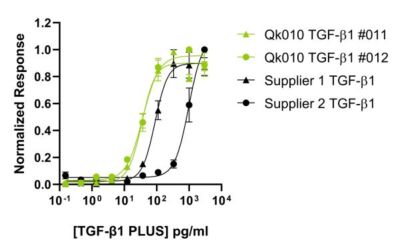
Quantitative luciferase reporter assays show TGF-β1 PLUS (Qk010, green) has higher bioactivity (EC50=1.4 pM for lot #011 and #012) when compared with mammalian expressed TGF-β1 from two alternative suppliers (blue, Supplier 1 EC50=3.5 pM, Supplier 2 EC50=38 pM.)
Human/bovine/porcine TGF-β1 PLUS protein (Qk010) is the first entirely animal-free recombinant human transforming growth factor beta 1 (TGF-β1) protein for highly reproducible results and compatible with chemically-defined stem cell media. TGF-β1 is used extensively in E8-style induced pluripotent (iPSC) and embryonic (ESC) stem cell media.
High purity 24 kDa dimer comprising optimised mature domain of TGF-β1 protein, animal origin-free (AOF) and carrier-protein free (CF). Our TGF-β1 PLUS protein has been extensively tested for maintenance of iPSC pluripotency by the specialist stem cell biotechnology company, Stemnovate, Cambridge, UK
Our TGF-β1 PLUS is part of our TGF beta family which comprises of the first quality-matched animal origin-free TGF–β 1,2 and 3 proteins for improved cell culture media development.
All our proteins are equally or more bioactive than those from other dominant suppliers
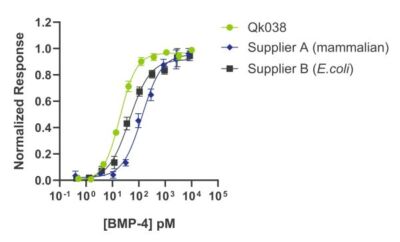
Bioactivity of recombinant BMP-4 protein was determined by a luciferase assay. Qkine E. coli expressed BMP-4 (Qk038, green) has a higher bioactivity (EC50=19.4 pM) than alternative mammalian expressed (Supplier A, blue, EC50=133.5 pM) and E. coli expressed (Supplier B, black, EC50=43.9 pM) BMP-4.
At Qkine, we test and validate the biological activity of all our growth factors against other suppliers’ proteins to ensure that we provide you with the highest level of biological activity.
Bioactivity comparison between leading suppliers shows Qk038 animal origin-free BMP-4 (expressed in E. coli) has a higher bioactivity than microbial and mammalian expressed BMP-4 from alternative suppliers.
